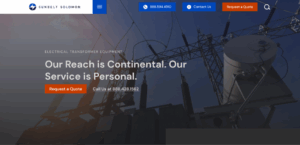Getting electricity for your construction site isn’t always easy. Remote locations can mean you’re devoid of access to the local grid.
If you need temporary power, we recommend a portable power station. Think of it like a giant battery that stores plenty of electricity, giving you all the power you need.
We’ll cover why your construction site needs a portable power station and everything it can do for you.
Blackouts
If the utility nearby is compromised or suffers an extended blackout, your construction site needs backup power. A portable power station is like a large battery bank that stores electricity. Within the station, an inverter takes the DC from within the battery and converts it to AC so that you can easily plug in your construction equipment and other appliances.
You might be skeptical about whether a portable power station has sufficient capacity to run power tools and other high-wattage equipment on a construction site. The short answer is they can. Some of these power stations have enough capacity to keep an entire house charged during a blackout, meaning more than enough power for your job.
Multiple Charging Types
There are multiple ways you can charge a portable power station, and each has its benefits. The fastest way to charge your station is via AC power. Of course, you should have it charged up the night before so it’s ready to go at the construction site.
Many stations can also recharge using the cigarette socket lighter found in vehicles. You’ll have to plug the unit into the socket lighter, then insert the cable into the input port of the station.
The most eco-friendly option is to charge your station via solar energy. Solar panels capture sunlight, which charges the lithium batteries in your power station. Be sure to purchase solar panels if you want to charge them via solar energy.
Having multiple options to recharge your unit means you never have to worry about wasting a day the construction day again.
Supplementary Electricity
Portable power stations don’t have to be the primary electricity source for your construction site. But they can supplement your existing electricity source like industrial solar or gas generators.
The combined electricity produced by the generators and the portable power station will help keep your work equipment, office buildings, and even trailers running.
Many portable power stations are stackable, meaning you can buy multiple units, giving you more storage capacity.
Quiet
A construction site is a loud environment, especially true when working in close quarters where loud generators could require hearing protection. There’s no need to risk hearing loss by adding another noisy device.
Fortunately, these units run on battery, meaning they’re quiet and aren’t noisy like gas or diesel generators. These machines don’t make much noise since they simply transfer stored energy. Most of them don’t hum any louder than a mini-fridge.
Emergencies
Whether you have access to the grid or not, portable power stations are perfect to have around in case of potential emergencies. Any extreme weather or natural disaster could completely wipe out your electricity source. Luckily, since power stations don’t run on fuel, the battery will be there when you need it most.
It’s crucial to have a backup plan in case things go wrong. And if you’ve been in construction for a while, you know things don’t always go as planned.
Portability
Construction companies typically take on multiple projects across a large service area. As a result, they need to move their power source from site to site.
While industrial generators are great for powering large operations, they’re also inconvenient to transport. Portable power stations are handy for projects that demand a temporary energy source for smaller-sized work equipment. These machines are compact and lightweight, so you can carry the station without worrying about loading them onto a truck.
Safe to Use
Conventional industrial gas generators can be dangerous, and you must use them at a distance from workers. Power stations run on battery, meaning they can be next to your work equipment.
They typically have built-in safety features like overload protection and an internal high/low-temperature gauge. Overload protection disengages the device from the input current when the current exceeds the safe charge capacity. The internal temperature gauge monitors the battery’s temperature and halts all output and input functions when the temperature falls out of the safe range determined by the manufacturer.
Wrapping It Up
Having ample electricity is an integral part of setting up your construction site. Between keeping devices charged, powering equipment, and lighting, you can’t get the job done without it.
Portable power stations can be backup for generators, meaning you’ll get an extra boost even when you run out of fuel like propane or diesel.
While you should consider other options like solar and gas generators, it’s essential to have a backup power plan in case things go awry.



Responses